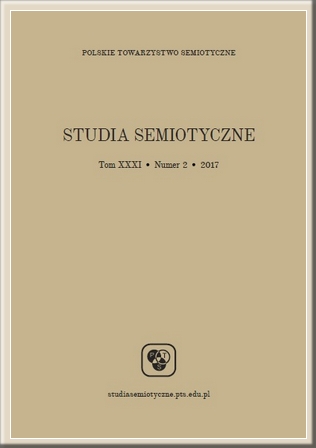Abstrakt
DOI: http://doi.org/10.26333/sts.xxxi2.05
What is the scope of a semantic theory consistent with the theoretical assumptions adopted by the generative program? In this paper I will show that the linguistic theory generically known as generative grammar is an extremely coherent Scientific Research Program and within this descriptive framework it’s possible to characterize the main features of an I-semantics. First, will be presented the hardcore of the generative program, its heuristics and Chomsky’s criticism towards formal semantics. Second, I will compare two approaches: the denotational approach by Larson and Segal and the intensional approach by Paul Pietroski. I argue in favor of Pietroski’s approach, because it is more coherent with the core assumptions of the generative program. The main argument is that syntax, in the context of the generative program is explanatory and, in this very context, semantics is not. Therefore, in order to account for the explanatory role of syntax in the generative program it is necessary to review certain foundational assumptions commonly accepted in formal semantics.
Bibliografia
Borg, E. (2004). Minimal Semantics. Oxford: Oxford University Press.
Boeckx, C. (2006). Linguistic Minimalism. Oxford: Oxford University Press.
Chomsky, N. (1965). Aspects of the Theory of Syntax. Cambridge, MA: MIT Press.
Chomsky, N. (1977). Essays on Form and Interpretation. New York: North Holland.
Chomsky, N. (1981). Lectures on Government and Binding. Dordrecht, Holland: Foris Publications.
Chomsky, N. (1986). Knowledge of Language. New York: Praeger.
Chomsky, N. (1995). Language and Nature. Mind, 104, 1–61.
Chomsky, N. (2000). New Horizons in the Study of Language and Mind. Cambridge: Cambridge University Press.
Chomsky, N. (2005). Three Fact ors in Language Design. Linguistic Inquiry, 36(1), 1–22.
Chomsky, N. (2012). The Science of Language: Interviews with James McGilvray. Cambridge: Cambridge University Press.
Cook, V. (2007). Chomsky’s Universal Grammar. An Introduction. Malden, MA: Blackwell Publishers.
D’Agostino, F. (1986). Chomsky’s System of Ideas. Oxford: Clarendon Press.
Heim, I., Kratzer, A. (1998). Semantics in Generative Grammar. Cambridge: Blackwell Publishers.
Lakatos, I. (1978). The Methodology of Scientific Research Programmes. Cambridge: Cambridge University Press.
Larson, R. (1995). Semantics. In L. Gleitman (Ed.), Invitation to Cognitive Science, Vol. 1. Language (pp. 361–380). Cambridge: MIT Press.
Larson, R., Segal, G. (1995). Knowledge of Meaning: an Introduction to Semantic Theory. Cambridge: MIT Press.
Lewis, D. (1972). General Semantics. In D. Davidson and G. Harman (Eds.), Semantics of Natural Language (pp. 169–218). Dordrecht–Boston: D. Reidel.
Ludlow, P. (2003). Referential Semantics for I-Languages? In L. Antony and N. Hornstein (Eds.), Chomsky and his Critics (pp. 140–161). Malden, MA: Blackwell Pub.
Ludlow, P. (2011). The Philosophy of Generative Linguistics. Oxford: Oxford University Press.
Ott, D. (2017). Strong Generative Capacity and the Empirical Base of Linguistic Theory. Frontiers of Psychology, 8, 1617.
Pietroski, P. M. (2002). Function and Concatenation. In G. Preyer and G. Peter (Eds.), Logical Form and Language (pp. 91–131). Oxford: Clarendon Press.
Pietroski, P. M. (2003a). Semantics and Metaphysics of Events. In K. Ludwig (Ed.), Contemporary Philosophy in Focus: on Davidson (pp. 137–162). Cambridge University Press.
Pietroski, P. M. (2003b). The Character of Natural Language Semantics. In A. Barber (Ed.), Epistemology of Language (pp. 217–256). Oxford: Oxford University Press.
Pietroski, P. M. (2005a). Events and Semantic Architecture. Oxford: Oxford University Press.
Pietroski, P. M. (2005b). Meaning Before Truth. In G. Preyer and G. Peters (Eds.), Contextualism in Philosophy (pp. 253–300). Oxford: Oxford University Press.
Pietroski, P. M. (2005c). Meaning Before Truth Conditions. Handout; available in: http://www.terpconnect.umd.edu/~pietro/research/papers/Arizona1.pdf
Pietroski, P. M. (2006a). Character Before Content. In J. Thomson and A. Byrne (Eds.), Content and Modality: Themes from the Philosophy of Robert Stalnaker (pp. 34–60). Oxford: Oxford University Press.
Pietroski, P. M. (2006b). Interpreting Concatenation and Concatenates. Philosophical Issues, 16, 221–245.
Pietroski, P. M. (2007). Systematicity via Monadicity. Croatian Journal of Philosophy, 7, 343–374.
Pietroski, P. M. (2008). Minimalist Meaning, Internalist Interpretation. Biolinguistics, 4, 317–341.
Pietroski, P. M. (2010). Concepts, Meanings, and Truth: First Nature, Second Nature, and Hard Work. Mind and Language, 25, 247–278.
Pietroski, P. M. (2010b). Describing I-junctions. Not published; available on: http://terpconnect.umd.edu/~pietro/research/papers/ijunctions.pdf
Pietroski, P. M. (2011). Minimal Semantic Instructions. In: C. Boeckx (ed.). The Oxford Handbook on Linguistic Minimalism (pp. 472–498). Oxford: Oxford University Press.
Pietroski, P. M. (2012). Semantic Monadicity with Conceptual Polyadicity. In M. Werning, W. Hinzen, and E. Machery (Eds.), The Oxford Handbook of Compositionality (pp. 129-148). Oxford: Oxford University Press.
Pietroski, P. M. (2015). Framing Event Variables. Erkenntnis, 80, 31–60.
Pietroski, P. M. (2017). Semantic Internalism. In J. McGilvray (Ed.), The Cambridge Companion to Chomsky (pp. 196–216), Cambridge: Cambridge University Press.
Pietroski, P. M., Hornstein, N. (2002). Does Every Sentence Like this Contain a Scope Ambiguity? In W. Hinzen and H. Rott (Eds.), Belief in Meaning: Essays at the Interface (pp. 43–72). Frankfurt: Hansel-Hohenhausen.
Pietroski, P. M., Hornstein, N. (2009). Basic Operations: Minimal Syntax-Semantics. Catalan Journal of Linguistics, 8, 113–139.
Putnam, H. (1973). Meaning and Reference. Journal of Philosophy, 70, 699–711.
Stainton, R. J. (2006). Meaning and Reference: Some Chomskian Themes. In
E. Lepore and B. C. Smith (Eds.), The Oxford Handbook of Philosophy of Language (pp. 913–940). Oxford: Oxford University Press.
Taylor, C. (1985). Philosophical Papers. Vol. 1: Human Agency and Language. Cambridge: Cambridge University Press.

